40 years ago, Forest began their defence of their amazing capture of the English First Division Championship with a home game in front of a star-studded Tottenham Hotspur side, freshly back in the top flight after their one-year demotion to the second division. It was a very hot day and the City Ground, with new capacity restrictions, was packed with over 41,000 eager fans anticipating the new season.
I was one of the many thirsty reds packed into in the Trent End that day, keen to see how Forest would do in the second season back in the top flight. After their emphatic 5-0 win over Ipswich Town in the Charity Shield last week, our confidence was sky high, but Spurs had three or four massive stars in their line up, including World Cup winner Osvaldo Ardiles, Ricardo Villa, Glen Hoddle and Steve Perryman.
But first, as Spurs didn't get the Forest40YearsAgo historical overview treatment last season (they were playing the likes of Leyton Orient, Bristol Rovers and Mansfield Town while we were winning the League and Cup double) I want to pay my due respects to a truly great club and do a brief plot of their very impressive history, especially in times before Clough (B.C.)
Whereas last season, the focus was on the past - the years B.C. - and the contrast with Forest's amazing new found greatness, this season's blog will focus more on the "glory years" for Forest. It's quite tricky to know where exactly to draw the line on that. Was it when Cloughie himself, took Forest down and they were relegated to the second division in 1992-93? Or was it four years later, after Frank Clark had led them back to the top flight before they were relegated again? In the end, I plumped for two years after that, when Forest were relegated from the top flight for the last time, in 1999. Over eighteen years later, we're still waiting, maybe this season even hoping, for a return.
So, in this blog post, I'll take a look at Forest v Spurs over the period 1978 through to 1999 too. But first, because it's Tottenham, let's go right back to the beginning for them and fast forward from there.
Previous Post: Charity Shield v Ipswich Town @ Wembley
It was around this time that Spurs adopted their current "lilly-whites" shirts. Before that they'd had a myriad of colours.
Spurs' success as an ambitious club inevitably led to them being elected to the league, but ironically not during the expansion in league members in 1905-06.
Spurs first season in the league (in the second division in 1908-1909) won them immediate promotion to the first...
... where they would face Forest in a competitive match for the first time. Their first two games, played on Christmas and Boxing Day 1909 were both 2-2 draws. Forest just edged above Spurs in the league but only by one point, and Spurs had a better goal average.
The next season, Forest had the better of the two games, winning 4-1 away but losing 1-2 at home. Spurs struggled, avoiding relegation by just five points, but Forest ended bottom of the league leaving Spurs in the top flight.
Spurs were relegated themselves in the last season before the first World War.
In very controversial circumstances, after the war, the first division was expanded by two teams and although Chelsea escaped the drop, Spurs didn't.
Worse was to come. Derby and Preston were, reasonably enough, promoted to the post-war first division and so were... (wait for it) ... Arsenal, who finished fifth.
Dodgy dealings must have been going on there. Let's be clear: Arsenal bribed their way into the top flight at Spurs' expense.
Still, Spurs won the second division easily enough (beating Forest 5-2 at home and drawing away in doing so) to regain their spot in the top flight and the very next season, they'd win their second major trophy, the F. A. Cup again, beating Wolves in the final.
Here's some old footage of the game...
Forest gained promotion back to the first division themselves a few seasons later but rarely enjoyed much success against Spurs who were already well-established as top dogs of the two clubs.
Spurs were relegated from the top flight themselves for the second time in 1927-28 but it didn't really help Forest out in this inter-club rivalry.
From 1919 to 1930 Forest played Spurs 13 times and only beat them once.
Spurs regained their first division status for two seasons, the first being 1933-34 before getting relegated again in 1934-35, so Spurs and Forest played 18 consecutive games against each other in second division until the second world war.
Here's a list of all the Spurs v Forest matches before the second world war. The "Last 5" column shows the status of the last five games between the sides. Although Tottenham dominated for much of the period, Forest started to have a good record against Spurs in the mid to late 30s, despite it being a poor part of Forest's history.
So, overall, in the first thirty encounters between Forest and Spurs, Forest were very much second best, only gaining eight wins out of 30.
Although Spurs hardly shone in the inter-war years they finished above us every season apart from one (in the second division in 1929-30).
This was the start of Spurs' Glory years under Nicholson. Club legends Danny Blanchflower and Dave Mackay shone in that side.
Throughout Bill Nicholson's time, Spurs were one of the most consistent sides in England. For the ten years from 1959 to 1969, the lowest they'd finish was 8th, even though Spurs would never (as yet) win that elusive third title win. It was undoubtedly Spurs' best ever ten year period. Their league record over that period by far the best.
Forest also started to peak themselves around this time. In the mid 1960s, under the astute management of the Irishman, Johnny Carey, Forest had their best season for years, finishing runners up to Manchester United and pipping Spurs for second spot in the league.
We also played them in a classic F. A. Cup semi-final at Hillsborough but lost 2-1.
So, it was Spurs, not Forest, at Wembley that year and Spurs clinched their 5th F.A. Cup, beating Chelsea in the final.
Here's a video clip of the 1967 F.A. Cup final...
After that F.A. Cup win, Spurs were about to start a strange slide downwards. They enjoyed just one more strong season in the league, finishing 3rd in 1970-71. It was enough to gain them qualification to the UEFA Cup the season after, which they won, beating Wolves in an all-English final.
It was during that season, the one Forest got relegated from the First Division, that I saw Spurs for the first time, beating us at the City Ground 1-0 on a cold February afternoon. They'd thrashed us 6-1 earlier in the season at White Hart Lane, so I suppose 1-0 wasn't too bad.
Another squad member, Ricardo Villa was also signed. Villa had missed the final - and in fact was only played for one half of Argentina's seven games - the second half against Brazil in the final group stage, ironically replacing Ardiles.
It was an exciting prospect to see these two in action and thousands descended on Trentside to watch the match.
Incidentally, this was John Robertson's 86th (out of an amazing 239) consecutive appearance for the Garibaldi Reds.
Televised that day was Chelsea's home defeat to Everton.
Elsewhere, West Ham started their life in the second division with a 5-2 win against Notts County and the Stags got a decent 0-0 draw at Exeter City in their first game back in the third.
Forest's opponents last night (back here in 2018), Wigan Atheltic played their first ever league game 40 years ago, a 0-0 draw away at relative league newboys, Hereford United.
I was one of the many thirsty reds packed into in the Trent End that day, keen to see how Forest would do in the second season back in the top flight. After their emphatic 5-0 win over Ipswich Town in the Charity Shield last week, our confidence was sky high, but Spurs had three or four massive stars in their line up, including World Cup winner Osvaldo Ardiles, Ricardo Villa, Glen Hoddle and Steve Perryman.
But first, as Spurs didn't get the Forest40YearsAgo historical overview treatment last season (they were playing the likes of Leyton Orient, Bristol Rovers and Mansfield Town while we were winning the League and Cup double) I want to pay my due respects to a truly great club and do a brief plot of their very impressive history, especially in times before Clough (B.C.)
Whereas last season, the focus was on the past - the years B.C. - and the contrast with Forest's amazing new found greatness, this season's blog will focus more on the "glory years" for Forest. It's quite tricky to know where exactly to draw the line on that. Was it when Cloughie himself, took Forest down and they were relegated to the second division in 1992-93? Or was it four years later, after Frank Clark had led them back to the top flight before they were relegated again? In the end, I plumped for two years after that, when Forest were relegated from the top flight for the last time, in 1999. Over eighteen years later, we're still waiting, maybe this season even hoping, for a return.
So, in this blog post, I'll take a look at Forest v Spurs over the period 1978 through to 1999 too. But first, because it's Tottenham, let's go right back to the beginning for them and fast forward from there.
Previous Post: Charity Shield v Ipswich Town @ Wembley
Tottenham Hotstory
Bobby Buckle, the most famous member of the original founders of Tottenham Hotspur, wasn't even born when Forest were in their third year of existence. Forest, the second oldest league club remember, were formed in 1865. Bobby Buckle was born four years later.
Bobby Buckle? Who's that? I hear you say. Well, it seems that Spurs were formed by a group of schoolboys who were part of a local cricket club (called "Hotspurs") who decided to play football during the winter months. Buckle was their leader.
Not even 14 years old, Buckle scored Spurs' first ever recorded goal on 20th October 1883.
I think any Spurs fan who has gleefully sang those chants about Arsene Wenger over the years - you know the song I'm thinking of - "with a cheeky smile" etc - should ponder about these facts. Spurs were originally a bunch of kids.
 |
| First Spurs team photo in 1865. Can you spot Bobby Buckle? |
Pre-War Years
Ten years after formation, Spurs started playing professional football and joined Southern League in 1896. Below is their first recorded league season. Not a bad start.
 |
| Southern League 1896-97 |
Spurs were an ambitious club and just three years later, they'd won that league for the first time, securing Spurs' first silverware.
 |
| Southern League 1899-1900 |
This was just a start though, and the next season, although still officially a "non-league club", Spurs won the F.A. Cup for the first time, beating Sheffield United 3-1 after a replay.
Here's some classic footage of the match.
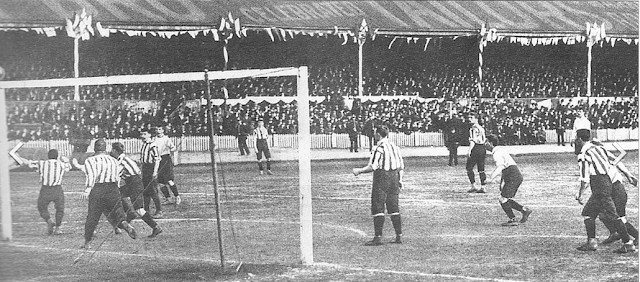 |
| Sandy Brown scores for Spurs against Sheffield United |
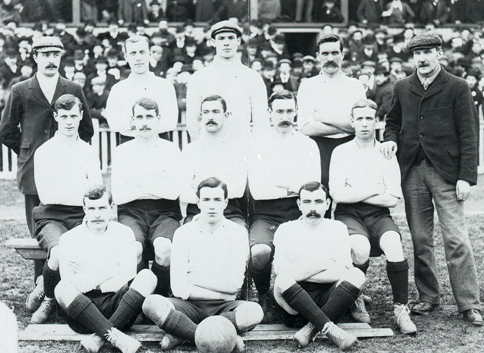 |
| Spurs F.A. Cup Winners 1901 |
 |
| From the great Website http://www.historicalkits.co.uk/ |
Spurs' success as an ambitious club inevitably led to them being elected to the league, but ironically not during the expansion in league members in 1905-06.
Spurs first season in the league (in the second division in 1908-1909) won them immediate promotion to the first...
... where they would face Forest in a competitive match for the first time. Their first two games, played on Christmas and Boxing Day 1909 were both 2-2 draws. Forest just edged above Spurs in the league but only by one point, and Spurs had a better goal average.
The next season, Forest had the better of the two games, winning 4-1 away but losing 1-2 at home. Spurs struggled, avoiding relegation by just five points, but Forest ended bottom of the league leaving Spurs in the top flight.
 |
| Early Spurs Programme |
Spurs were relegated themselves in the last season before the first World War.
In very controversial circumstances, after the war, the first division was expanded by two teams and although Chelsea escaped the drop, Spurs didn't.
Worse was to come. Derby and Preston were, reasonably enough, promoted to the post-war first division and so were... (wait for it) ... Arsenal, who finished fifth.
Dodgy dealings must have been going on there. Let's be clear: Arsenal bribed their way into the top flight at Spurs' expense.
Still, Spurs won the second division easily enough (beating Forest 5-2 at home and drawing away in doing so) to regain their spot in the top flight and the very next season, they'd win their second major trophy, the F. A. Cup again, beating Wolves in the final.
Here's some old footage of the game...
Spurs were relegated from the top flight themselves for the second time in 1927-28 but it didn't really help Forest out in this inter-club rivalry.
From 1919 to 1930 Forest played Spurs 13 times and only beat them once.
Spurs regained their first division status for two seasons, the first being 1933-34 before getting relegated again in 1934-35, so Spurs and Forest played 18 consecutive games against each other in second division until the second world war.
 |
| Arsenal at the peak of their glory years, Spurs relegated again |
Here's a list of all the Spurs v Forest matches before the second world war. The "Last 5" column shows the status of the last five games between the sides. Although Tottenham dominated for much of the period, Forest started to have a good record against Spurs in the mid to late 30s, despite it being a poor part of Forest's history.
So, overall, in the first thirty encounters between Forest and Spurs, Forest were very much second best, only gaining eight wins out of 30.
Although Spurs hardly shone in the inter-war years they finished above us every season apart from one (in the second division in 1929-30).
Post-War (but BC)
But things got better for Tottenham Hotspur after the war and in 1949-50 they regained promotion back to the first division after a 15 year absence. They were now under the guidance of one of Tottenham's favourite sons (literally,) Arthur Rowe.
There can't be many famous club managers who were actually born in the location of the club they'd go on to be famous for, but Rowe certainly was one of their own.
He made over 200 appearances for the club as a defender before a cartilage injury cut short his career before he became Spurs manager in 1949, winning them instant promotion.
There can't be many famous club managers who were actually born in the location of the club they'd go on to be famous for, but Rowe certainly was one of their own.
 |
| Arthur Rowe - pen pushing. (presumably running later.) |
Repeating the history of 1921, Spurs had a glorious return to the top division - this time, winning the league for the first time. This was the famous Spurs era of "push and run football".
Among their stars that season was Leslie Medley.
Spurs finished runners up the next season but then fell away for a few years.
By the time they were rejoined by a resurgent Forest side, now well-managed by Billy Walker, in 1957-58, Spurs were back on the ascendancy again though.
Forest pipped Spurs in the league for only the second time in 49 years, when their Cup winning side of 1958-59 finished five places above them in the first division.
Spurs finished 18th that season but this disappointing season opened the door for for a new manager to join the club and take it to new heights. Scarborough born, Bill Nicholson became Spurs manager in October 1958 and managed the club for the next 26 years.
Most famously, within a couple of years, Spurs won the League and Cup double. They were only the third English club to do so (after Preston North End 1888-89 and Aston Villa 1896-97).
They won the league by a massive eight points margin...
... and beat Leicester City in the Cup final at Wembley.
Spurs won 2-0 with goals from Bobby Smith and Terry Dyson.
Here's some classic footage of their F.A. Cup win which clinched them the double.
This was the start of Spurs' Glory years under Nicholson. Club legends Danny Blanchflower and Dave Mackay shone in that side.
 |
| Danny Blanchflower |
Here's some classic video of the double win...
Perhaps unsurprisingly, this was not a good time to be a Forest fan if you were watching them play Tottenham. Spurs beat Forest five times on the trot in this period, their best ever run against us. We somehow managed to beat them 2-0 at the City Ground early the next season but this would be our only win against Spurs in 15 attempts between 1957 and 1965. In September 1962, Spurs thrashed Forest 9-2 to rub in their superiority. Jimmy Greaves scored four that day.
Spurs retained the cup the year after winning the double, but not the league. This was 1961-62, Alf Ramsay's famous "flash in the pan" season, when he guided Ipswich Town to their first and only first division title immediately after getting promotion.
Spurs beat Burnley 3-1 at Wembley in the cup final with Jimmy Greaves getting his name on the score sheet.
Spurs enjoyed success in Europe after this, winning the Cup Winners Cup. As double winners, they'd entered the European Cup in 1961-62 season and made good progress before losing to Benfica in the semi final.
There was no slip ups this time, though as Spurs powered their way to a 5-1 win against Atletico Madrid in the final in Rotterdam.
 |
| Greaves bags another in their 9-2 win over Forest on 29th September 1962 |
Spurs retained the cup the year after winning the double, but not the league. This was 1961-62, Alf Ramsay's famous "flash in the pan" season, when he guided Ipswich Town to their first and only first division title immediately after getting promotion.
Spurs beat Burnley 3-1 at Wembley in the cup final with Jimmy Greaves getting his name on the score sheet.
 |
| Jimmy Greaves with his first medal for Spurs |
Spurs enjoyed success in Europe after this, winning the Cup Winners Cup. As double winners, they'd entered the European Cup in 1961-62 season and made good progress before losing to Benfica in the semi final.
There was no slip ups this time, though as Spurs powered their way to a 5-1 win against Atletico Madrid in the final in Rotterdam.
Throughout Bill Nicholson's time, Spurs were one of the most consistent sides in England. For the ten years from 1959 to 1969, the lowest they'd finish was 8th, even though Spurs would never (as yet) win that elusive third title win. It was undoubtedly Spurs' best ever ten year period. Their league record over that period by far the best.
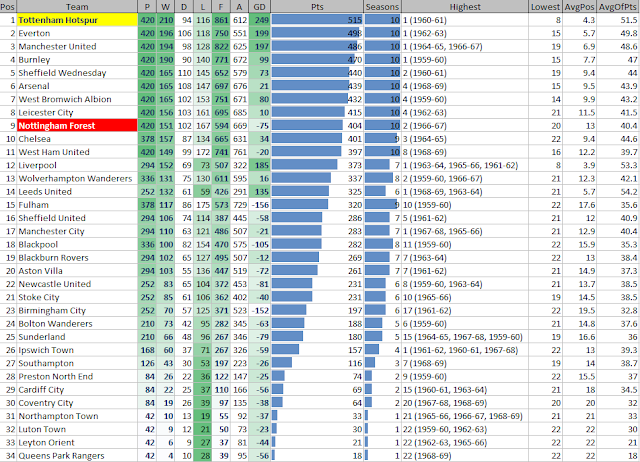 |
| First Division Composite Table 1959-1969 |
 |
| Hard-man Dave Mackay famously advising Billy Bremner |
Forest also started to peak themselves around this time. In the mid 1960s, under the astute management of the Irishman, Johnny Carey, Forest had their best season for years, finishing runners up to Manchester United and pipping Spurs for second spot in the league.
 |
| Forest's best season B.C. |
We also played them in a classic F. A. Cup semi-final at Hillsborough but lost 2-1.
So, it was Spurs, not Forest, at Wembley that year and Spurs clinched their 5th F.A. Cup, beating Chelsea in the final.
Here's a video clip of the 1967 F.A. Cup final...
After that F.A. Cup win, Spurs were about to start a strange slide downwards. They enjoyed just one more strong season in the league, finishing 3rd in 1970-71. It was enough to gain them qualification to the UEFA Cup the season after, which they won, beating Wolves in an all-English final.
 |
| UEFA Cup Winners |
It was during that season, the one Forest got relegated from the First Division, that I saw Spurs for the first time, beating us at the City Ground 1-0 on a cold February afternoon. They'd thrashed us 6-1 earlier in the season at White Hart Lane, so I suppose 1-0 wasn't too bad.
Here's the footage of that match.
 |
| The first time I saw Spurs |
 |
| I almost forgot - Spurs also won the League Cup twice in the early 1970s - 71 and 73. |
Here is a full list of post-war (but still B.C.) Spurs v Forest matches.
So, in the post-war period, before the arrival of OBE himself, Forest's record against Spurs was pretty poor.
See that? 29% Shocking!
He hadn't even officially started as Forest manager before he started having an influence of Forest's record against Spurs.
He watched from the Main Stand as Forest drew 1-1 with Spurs in the F.A. Cup 3rd Round on 4th January 1975, Miah Dennehy playing a blinder. Two days later, he was officially appointed and his first match in charge was for the replay, at White Hart Lane the following day.
In typical Clough style, he grabbed the headlines as Forest pulled off a shock 1-0 win with a Neil Martin goal.
Inexplicably, Dennehy was dropped and would never figure in Cloughie's rebuilding of the club. He only played three more games for the club (but scored both goals against Bolton) before being sold off to Walsall. Years later, in a pub in Cork, Miah told me he didn't understand it either. "Oy tink der man jus dint loik me" he said as his necked his fifth pint of Murphy's inside an hour and a half.
Some of us remember you - and loyked you, though, Miah!
Whilst Forest were being rebuilt by Brian Clough, Spurs made mistakes in handling the massive legacy given to them by Bill Nicholson.
In the previous 26 years, Spurs had the best record in the First Division but perhaps the club weren't quick enough to see that his era was coming to an end and they were relegated after Nicholson's sad resignation.
Keith Burkinshaw was appointed manager and won them promotion back to the top flight, although there were a few scares on the way, including a thrilling 3-3 draw at Field Mill when they were lucky not to lose against a plucky Mansfield Town who were destined to go down after their one season in the second division.
So this pretty much brings us up to date.
The 1977-78 First Division Champions - Nottingham Forest and, 24 places below them (the most ever, of course) - Tottenham Hotspur, promoted back to the first division.
So, after all this great history, with Spurs dominating over Forest for decades....
... the bottom line is still that, in terms of league title wins, Forest were (and still are) only just behind Spurs in the table of champions.
See that? 29% Shocking!
Enter, Brian
We Forest fans needed some good news here, and it came in the form of that cocky young man from Middlesbrough, Brian Clough.He hadn't even officially started as Forest manager before he started having an influence of Forest's record against Spurs.
He watched from the Main Stand as Forest drew 1-1 with Spurs in the F.A. Cup 3rd Round on 4th January 1975, Miah Dennehy playing a blinder. Two days later, he was officially appointed and his first match in charge was for the replay, at White Hart Lane the following day.
In typical Clough style, he grabbed the headlines as Forest pulled off a shock 1-0 win with a Neil Martin goal.
 |
| Classic Image of Clough's first win for Forest, 1-0 at Spurs |
Inexplicably, Dennehy was dropped and would never figure in Cloughie's rebuilding of the club. He only played three more games for the club (but scored both goals against Bolton) before being sold off to Walsall. Years later, in a pub in Cork, Miah told me he didn't understand it either. "Oy tink der man jus dint loik me" he said as his necked his fifth pint of Murphy's inside an hour and a half.
Some of us remember you - and loyked you, though, Miah!
Whilst Forest were being rebuilt by Brian Clough, Spurs made mistakes in handling the massive legacy given to them by Bill Nicholson.
In the previous 26 years, Spurs had the best record in the First Division but perhaps the club weren't quick enough to see that his era was coming to an end and they were relegated after Nicholson's sad resignation.
 |
| First Division - top 22 from 1950 until 1976 |
 |
| Down with the maccems, you're going down with the maccems! |
Keith Burkinshaw was appointed manager and won them promotion back to the top flight, although there were a few scares on the way, including a thrilling 3-3 draw at Field Mill when they were lucky not to lose against a plucky Mansfield Town who were destined to go down after their one season in the second division.
So this pretty much brings us up to date.
The 1977-78 First Division Champions - Nottingham Forest and, 24 places below them (the most ever, of course) - Tottenham Hotspur, promoted back to the first division.
 |
| We are the Champions! |
 |
| Spurs scrape back to the top flight by the skin of a cockerel's tooth |
So, after all this great history, with Spurs dominating over Forest for decades....
 |
| Forest only topped Spurs in six seasons out of 89 - then came Brian! |
 |
| Spurs should have won the title more often |
It's a cruel game, isn't it?
Ardiles and Villa
In complete contrast to Forest's absence from the transfer market in the close season, Spurs had shocked the world with a bold and brash move to sign not one, but two, World Cup winners.
Just 55 days earlier, Osvaldo Ardiles had been one of the XI that won the World Cup for Argentina, beating Holland 3-1 in the final. Ardiles started in five of Argentina's matches.
Another squad member, Ricardo Villa was also signed. Villa had missed the final - and in fact was only played for one half of Argentina's seven games - the second half against Brazil in the final group stage, ironically replacing Ardiles.
 |
| Burkinshaw's Double Coup |
 |
| Spurs' incredible £750,000 summer signings |
Match 272 (195th Forest, 3rd Spurs, 136th at the City Ground)
40 years ago, I had just turned 19 and, after having packed in university after a gloomy single term trying (but failing miserably) to get my head around "red brick" university-level maths, I'd left to work as a "knitter" - a job that required walking endlessly up and down a row of net curtain machines checking for damages at the front of them and replacing bobbins before the thread ran out at the back.
I'd secured a place back at Nottingham for the term which was due to start in September, having changed to a joint honours degree in Zoology and Pharmacology and I was quite excited at the prospect. I'd subscribed to New Scientist magazine and was really getting interested in the Life Sciences again.
So, it was great to be able to head off on the No 84 bus to Nottingham to watch Forest in action that day.
I don't have many memories of the day but it was very hot and congested. There were stories of Spurs fans drinking water from the Trent and many arrived late and got into the Bridgeford end, reserved for Forest fans.
 |
| 19 years old 40 years ago - 59 yesterday, My Beddian Birthday. |
I'd secured a place back at Nottingham for the term which was due to start in September, having changed to a joint honours degree in Zoology and Pharmacology and I was quite excited at the prospect. I'd subscribed to New Scientist magazine and was really getting interested in the Life Sciences again.
So, it was great to be able to head off on the No 84 bus to Nottingham to watch Forest in action that day.
I don't have many memories of the day but it was very hot and congested. There were stories of Spurs fans drinking water from the Trent and many arrived late and got into the Bridgeford end, reserved for Forest fans.
Some spilled onto the pitch, requiring mounted police and delaying the kick off.
Martin O'Neill put Forest into the lead but Villa equalised for Spurs before half time, elegantly rounding Peter Shilton before slotting home.
 |
| Martin O'Neill scores for Forest |
 |
| Hoddle versus Gemmill |
 |
| Archie Gemmill linked with Argentina again |
 |
| John McGovern against Spurs |
 |
| Tony Woodcock close |
 |
| Ricardo at the City Ground |
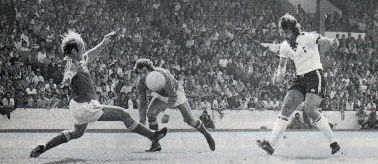 |
| Villa equalises for Spurs |
 |
| Last Peter Withe chance for Forest |
The Other Opening Day Matches
The first day of the league programme was always a big day in the calendar and there were plenty of big crowds. Amazing that Forest's 41,000 was only the 5th largest attendance.
Ominously, Liverpool won 2-1 at home to QPR. We had known, since July 11th, that our hopes of European glory had been jolted with a massive obstacle placed in front of us, in the form of the unluckiest 1st Round draw. On 13th September, in just 25 days time, Forest were due to square up to face the current European Champions in Nottingham first - the worst possible draw. So, we read every bit of news about Liverpool very nervously. Unlike Forest, they'd dipped into the transfer market to strengthen their squad still further. They'd spent £80,000 on a young 18 year old from Hereford United and £300,000 on a new left back, Alan Kennedy, from Newcastle United. Forest... nowt. And now we were about to sell our No 1 striker.
Ominously, Liverpool won 2-1 at home to QPR. We had known, since July 11th, that our hopes of European glory had been jolted with a massive obstacle placed in front of us, in the form of the unluckiest 1st Round draw. On 13th September, in just 25 days time, Forest were due to square up to face the current European Champions in Nottingham first - the worst possible draw. So, we read every bit of news about Liverpool very nervously. Unlike Forest, they'd dipped into the transfer market to strengthen their squad still further. They'd spent £80,000 on a young 18 year old from Hereford United and £300,000 on a new left back, Alan Kennedy, from Newcastle United. Forest... nowt. And now we were about to sell our No 1 striker.
Televised that day was Chelsea's home defeat to Everton.
Elsewhere, West Ham started their life in the second division with a 5-2 win against Notts County and the Stags got a decent 0-0 draw at Exeter City in their first game back in the third.
Forest's opponents last night (back here in 2018), Wigan Atheltic played their first ever league game 40 years ago, a 0-0 draw away at relative league newboys, Hereford United.
 |
| Wigan Athletic played their first league game 40 years ago today |
Forest suddenly Withe-out
So, this was not a great start for Forest's defence of the league title and things looked much worse two days later as Peter Withe left the club to join Newcastle United for £250,000.
Considering Forest had started the season with no new signings this move seemed a little reckless to say the least, but this is what you got with Cloughie - rarely was there any rhyme or reason.
The stories have it that Withe and Clough fell out over a fiver. Peter Withe thought he was worth a rise, Clough didn't. That such a big part of Forest's success over the last two years was sacrificed over such a small figure seems crazy today, but I guess Clough was making some kind of point, one of those "We have a discussion and then we agree I am right" type occasions.
Credit to Withe, though, for sticking to his guns and having the confidence in his own ability.
Three and a half years later, with Forest languishing in a relatively mediocre mid-table position, Peter Withe, then at Aston Villa, was holding the European Cup aloft.
Withe was a relatively late starter. After brief spells with Southport and Barrow, Withe went abroad and played in South Africa before returning to sign for Wolves for a while. He went to the USA to score goals for fun for Portland Timbers before returning to the West Midlands to join Birmingham City where his career really started, at the age of 25.
His spell at Forest, massive as it seems to us, was a relatively small part of his career. Just one of 14 clubs. Only about 13% of his 557 league appearances were made for Forest.
I 've made the point before, but I think Forest's amazing success 40 years ago was more to do with a certain player and less to do with the management team, than we think.
As I pointed out in the last but one match - the West Brom blog - last season, I think John Robertson's contribution has been under-estimated. I don't think it's a coincidence that Forest were at their best when he was and that their slide from the pinnacle of European football coincided with Robbo's injury and eventual loss of his best form.
Forest's total lack of involvement in the transfer market during the close season and the ridiculously stubborn selling of Peter Withe after the season's start looks nothing less than bad management from here.
Anyway, for the next six years or so, Forest continued to compete with the best in England (Liverpool) and had the second best record in the league, as well as winning lots of silverware which I'll take delight in reminding people about in the forthcoming weeks.
Spurs, in contrast, were pretty average over the same period.
But as the Premier League era began, and the money men became increasingly important, Forest started to fade and Spurs grew increasingly strong.
It was a great game, of course. Just tragic that we lost.
As Forest ended the 20th century sliding towards oblivion, their record against Spurs bizarrely got better than ever.
This is a theme I'll return to over this season - the period from 1977 until 1999, our best twenty-two years ever.
Considering Forest had started the season with no new signings this move seemed a little reckless to say the least, but this is what you got with Cloughie - rarely was there any rhyme or reason.
The stories have it that Withe and Clough fell out over a fiver. Peter Withe thought he was worth a rise, Clough didn't. That such a big part of Forest's success over the last two years was sacrificed over such a small figure seems crazy today, but I guess Clough was making some kind of point, one of those "We have a discussion and then we agree I am right" type occasions.
Credit to Withe, though, for sticking to his guns and having the confidence in his own ability.
Three and a half years later, with Forest languishing in a relatively mediocre mid-table position, Peter Withe, then at Aston Villa, was holding the European Cup aloft.
 |
| Withe Cup, in 1982, Forest Withe Out |
Withe was a relatively late starter. After brief spells with Southport and Barrow, Withe went abroad and played in South Africa before returning to sign for Wolves for a while. He went to the USA to score goals for fun for Portland Timbers before returning to the West Midlands to join Birmingham City where his career really started, at the age of 25.
 |
| Withe Career, will travel |
His spell at Forest, massive as it seems to us, was a relatively small part of his career. Just one of 14 clubs. Only about 13% of his 557 league appearances were made for Forest.
 |
| Thanks for the slice, Peter |
Forest Programmes Over the Years
Forest started the new season with a new look programme as well as a ground that had had a bit (but not much) of a facelift. For the first time, we had a full-colour photographs on the front cover.
Before looking at that, here's a quick summary of the way the programme has changed over the years.
The Programme
What came next?
I don't plan to do as many blogs this season as I did last but for each domestic (as opposed to European) match I do, I'll try to take a look to the future from the game in question.
Last season, I was almost totally looking to the past, putting Forest's amazing season in the context of the relatively barren years the club had experienced B.C. This season I want to pay a full tribute to the success Brain Clough and Peter Taylor brought to the club and focus in on the period of success we enjoyed overall, as well as this season of European Cup success. Next season, I plan to look at Forest's third great year and contrast it with the barren years that have followed. You never know, by then, perhaps Forest might even have returned to the top flight again.
So, here's a chart showing the league form of Spurs and Forest in the years that followed, up until Forest's final relegation from the top flight.
 |
| Spurs stable, Forest Decline from 1977 until 1999 |
I 've made the point before, but I think Forest's amazing success 40 years ago was more to do with a certain player and less to do with the management team, than we think.
As I pointed out in the last but one match - the West Brom blog - last season, I think John Robertson's contribution has been under-estimated. I don't think it's a coincidence that Forest were at their best when he was and that their slide from the pinnacle of European football coincided with Robbo's injury and eventual loss of his best form.
Forest's total lack of involvement in the transfer market during the close season and the ridiculously stubborn selling of Peter Withe after the season's start looks nothing less than bad management from here.
Anyway, for the next six years or so, Forest continued to compete with the best in England (Liverpool) and had the second best record in the league, as well as winning lots of silverware which I'll take delight in reminding people about in the forthcoming weeks.
Spurs, in contrast, were pretty average over the same period.
But as the Premier League era began, and the money men became increasingly important, Forest started to fade and Spurs grew increasingly strong.
 |
| Forest's best ever seven years: 1977-1984 |
The biggest match between the two clubs in this period was, of course, the 1991 F.A. Cup Final. It was the 100th competitive match between the clubs. Sadly, Brian Clough, again, failed to win the one trophy that would always elude him. I was there, watching with my old mate from Kirkby, Paul Stevenson.
 |
| Psycho! Psycho! |
It was a great game, of course. Just tragic that we lost.
As Forest ended the 20th century sliding towards oblivion, their record against Spurs bizarrely got better than ever.
 |
| Spurs v Forest since Cloughie, until 1999 |
 |
| Forest had the edge over Spurs under Clough |
 |
| But in the big picture, Spurs still well on top, of course. |
This is a theme I'll return to over this season - the period from 1977 until 1999, our best twenty-two years ever.
 |
| Forest's era at the top ended with the new millenium |




































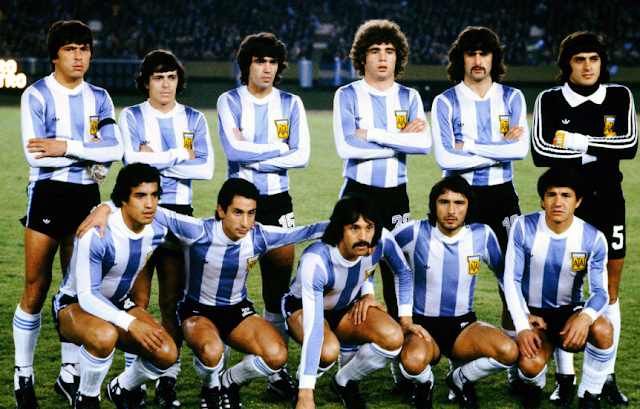






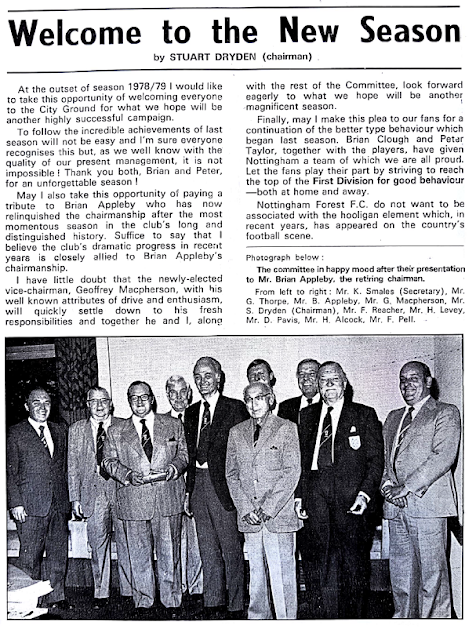











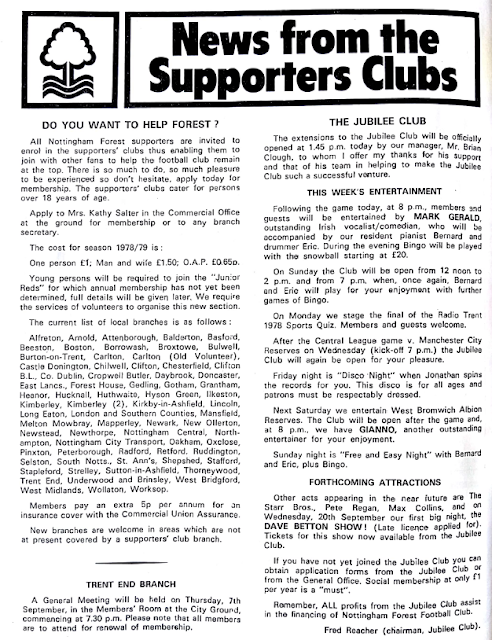





Comments
Post a Comment